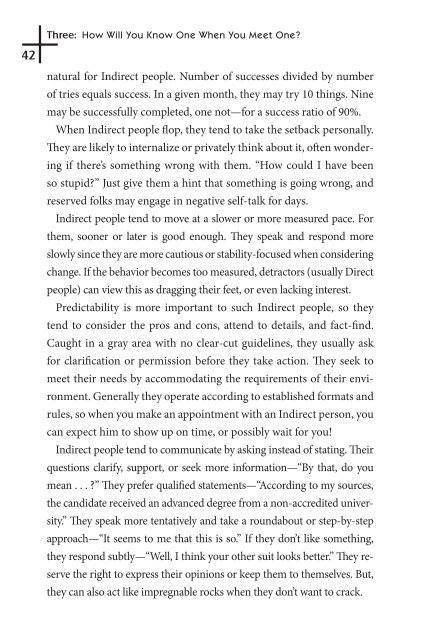PeopleSmart in Business eBook - The Platinum Rule
PeopleSmart in Business eBook - The Platinum Rule
PeopleSmart in Business eBook - The Platinum Rule
You also want an ePaper? Increase the reach of your titles
YUMPU automatically turns print PDFs into web optimized ePapers that Google loves.
42<br />
Three: How Will You Know One When You Meet One?<br />
natural for Indirect people. Number of successes divided by number<br />
of tries equals success. In a given month, they may try 10 th<strong>in</strong>gs. N<strong>in</strong>e<br />
may be successfully completed, one not—for a success ratio of 90%.<br />
When Indirect people fl op, they tend to take the setback personally.<br />
Th ey are likely to <strong>in</strong>ternalize or privately th<strong>in</strong>k about it, oft en wonder<strong>in</strong>g<br />
if there’s someth<strong>in</strong>g wrong with them. “How could I have been<br />
so stupid?” Just give them a h<strong>in</strong>t that someth<strong>in</strong>g is go<strong>in</strong>g wrong, and<br />
reserved folks may engage <strong>in</strong> negative self-talk for days.<br />
Indirect people tend to move at a slower or more measured pace. For<br />
them, sooner or later is good enough. Th ey speak and respond more<br />
slowly s<strong>in</strong>ce they are more cautious or stability-focused when consider<strong>in</strong>g<br />
change. If the behavior becomes too measured, detractors (usually Direct<br />
people) can view this as dragg<strong>in</strong>g their feet, or even lack<strong>in</strong>g <strong>in</strong>terest.<br />
Predictability is more important to such Indirect people, so they<br />
tend to consider the pros and cons, attend to details, and fact-fi nd.<br />
Caught <strong>in</strong> a gray area with no clear-cut guidel<strong>in</strong>es, they usually ask<br />
for clarifi cation or permission before they take action. Th ey seek to<br />
meet their needs by accommodat<strong>in</strong>g the requirements of their environment.<br />
Generally they operate accord<strong>in</strong>g to established formats and<br />
rules, so when you make an appo<strong>in</strong>tment with an Indirect person, you<br />
can expect him to show up on time, or possibly wait for you!<br />
Indirect people tend to communicate by ask<strong>in</strong>g <strong>in</strong>stead of stat<strong>in</strong>g. Th eir<br />
questions clarify, support, or seek more <strong>in</strong>formation—“By that, do you<br />
mean . . . ?” Th ey prefer qualifi ed statements—“Accord<strong>in</strong>g to my sources,<br />
the candidate received an advanced degree from a non-accredited university.”<br />
Th ey speak more tentatively and take a roundabout or step-by-step<br />
approach—“It seems to me that this is so.” If they don’t like someth<strong>in</strong>g,<br />
they respond subtly—“Well, I th<strong>in</strong>k your other suit looks better.” Th ey reserve<br />
the right to express their op<strong>in</strong>ions or keep them to themselves. But,<br />
they can also act like impregnable rocks when they don’t want to crack.


